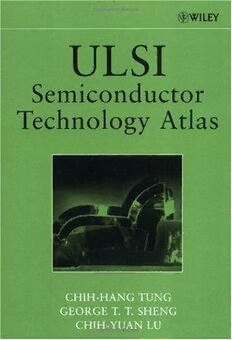Download ULSI Semiconductor Technology Atlas PDF Free - Full Version
Download ULSI Semiconductor Technology Atlas by Chih-Hang Tung, George T. T. Sheng, Chih-Yuan Lu in PDF format completely FREE. No registration required, no payment needed. Get instant access to this valuable resource on PDFdrive.to!
About ULSI Semiconductor Technology Atlas
More than 1,100 TEM images illustrate the science of ULSIThe natural outgrowth of VLSI (Very Large Scale Integration), Ultra Large Scale Integration (ULSI) refers to semiconductor chips with more than 10 million devices per chip. Written by three renowned pioneers in their field, ULSI Semiconductor Technology Atlas uses examples and TEM (Transmission Electron Microscopy) micrographs to explain and illustrate ULSI process technologies and their associated problems.The first book available on the subject to be illustrated using TEM images, ULSI Semiconductor Technology Atlas is logically divided into four parts:* Part I includes basic introductions to the ULSI process, device construction analysis, and TEM sample preparation * Part II focuses on key ULSI modules--ion implantation and defects, dielectrics and isolation structures, silicides/salicides, and metallization * Part III examines integrated devices, including complete planar DRAM, stacked cell DRAM, and trench cell DRAM, as well as SRAM as examples for process integration and development * Part IV emphasizes special applications, including TEM in advanced failure analysis, TEM in advanced packaging development and UBM (Under Bump Metallization) studies, and high-resolution TEM in microelectronics This innovative guide also provides engineers and managers in the microelectronics industry, as well as graduate students, with:* More than 1,100 TEM images to illustrate the science of ULSI* A historical introduction to the technology as well as coverage of the evolution of basic ULSI process problems and issues* Discussion of TEM in other advanced microelectronics devices and materials, such as flash memories, SOI, SiGe devices, MEMS, and CD-ROMs
Detailed Information
| Author: | Chih-Hang Tung, George T. T. Sheng, Chih-Yuan Lu |
|---|---|
| Publication Year: | 2003 |
| ISBN: | 9780471457725 |
| Pages: | 671 |
| Language: | English |
| File Size: | 26.097 |
| Format: | |
| Price: | FREE |
Safe & Secure Download - No registration required
Why Choose PDFdrive for Your Free ULSI Semiconductor Technology Atlas Download?
- 100% Free: No hidden fees or subscriptions required for one book every day.
- No Registration: Immediate access is available without creating accounts for one book every day.
- Safe and Secure: Clean downloads without malware or viruses
- Multiple Formats: PDF, MOBI, Mpub,... optimized for all devices
- Educational Resource: Supporting knowledge sharing and learning
Frequently Asked Questions
Is it really free to download ULSI Semiconductor Technology Atlas PDF?
Yes, on https://PDFdrive.to you can download ULSI Semiconductor Technology Atlas by Chih-Hang Tung, George T. T. Sheng, Chih-Yuan Lu completely free. We don't require any payment, subscription, or registration to access this PDF file. For 3 books every day.
How can I read ULSI Semiconductor Technology Atlas on my mobile device?
After downloading ULSI Semiconductor Technology Atlas PDF, you can open it with any PDF reader app on your phone or tablet. We recommend using Adobe Acrobat Reader, Apple Books, or Google Play Books for the best reading experience.
Is this the full version of ULSI Semiconductor Technology Atlas?
Yes, this is the complete PDF version of ULSI Semiconductor Technology Atlas by Chih-Hang Tung, George T. T. Sheng, Chih-Yuan Lu. You will be able to read the entire content as in the printed version without missing any pages.
Is it legal to download ULSI Semiconductor Technology Atlas PDF for free?
https://PDFdrive.to provides links to free educational resources available online. We do not store any files on our servers. Please be aware of copyright laws in your country before downloading.
The materials shared are intended for research, educational, and personal use in accordance with fair use principles.

